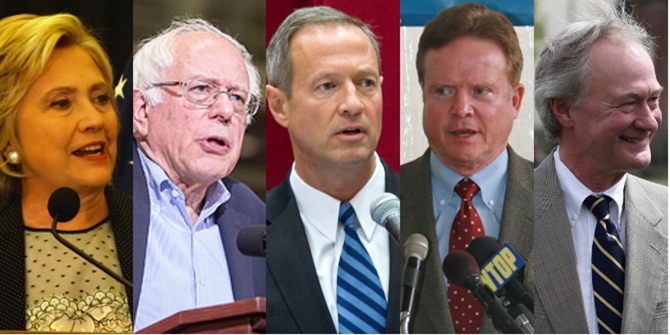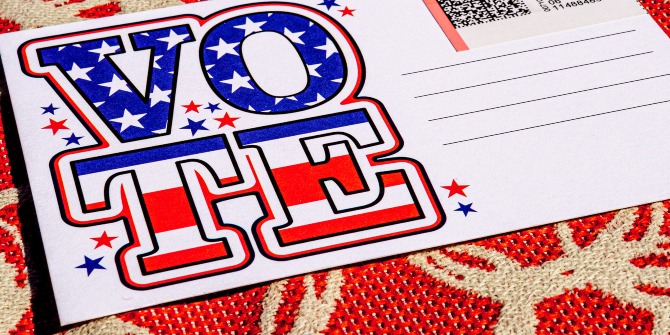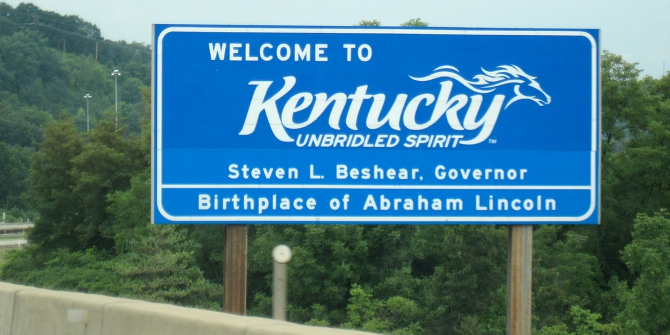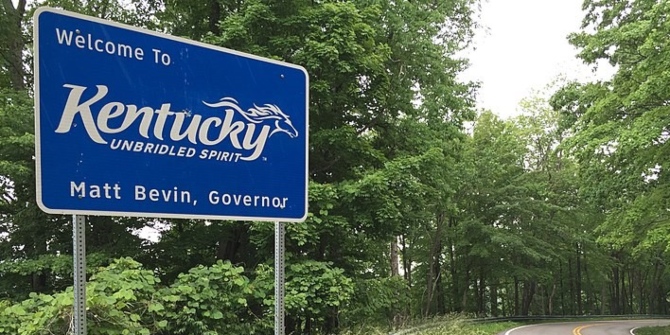 On Tuesday night, the five announced candidates for the Democratic presidential nomination debated for the first time. Anne Cizmar reviews the debate, writing that while there was unity among candidates compared with the Republican Party’s recent debates, issues such as gun control and foreign policy showed the divisions between the candidates. She argues that while Hillary Clinton, Bernie Sanders performed solidly, Martin O’Malley, Lincoln Chafee and Jim Webb did little to help their campaigns’ prospects.
On Tuesday night, the five announced candidates for the Democratic presidential nomination debated for the first time. Anne Cizmar reviews the debate, writing that while there was unity among candidates compared with the Republican Party’s recent debates, issues such as gun control and foreign policy showed the divisions between the candidates. She argues that while Hillary Clinton, Bernie Sanders performed solidly, Martin O’Malley, Lincoln Chafee and Jim Webb did little to help their campaigns’ prospects.
The Democratic presidential candidates faced off in the first of six Democratic nomination debates on Tuesday night. Five candidates shared the stage in Nevada in the debate hosted by CNN. The two front-runner candidates—Hillary Clinton and Bernie Sanders—were joined by three lesser-known candidates—Jim Webb, Lincoln Chafee, and Martin O’Malley. Despite weeks of speculation, and a campaign encouraging him to run Joe Biden (the current vice president of the United States) did not declare his candidacy or compete in the first debate.
The debate broadcast lasted around two and a half hours, and covered a wide range of topics. Candidates were asked about potential challenges to their electability, gun control, foreign policy, the greatest national security threat facing the United States, healthcare, college affordability, and immigration, among other policies. The debate was heavily focused on policy discussions. Several of the candidates contrasted the Democratic debate against the previous Republican nomination debates, arguing that all of the Democratic candidates are focused on discussing policies to make America better rather than fighting amongst themselves. O’Malley, the former Mayor of Baltimore and former Governor of Maryland, had a noteworthy moment toward the end of the debate when he specifically said that Democrats had a very different debate than Republicans because “you didn’t hear anyone denigrate women, you didn’t hear anyone make racist comments about new American immigrants, you didn’t hear anyone speak ill of another American because of their religious belief” .
Another moment of Democratic unity came when Sanders aided Clinton’s response to the email scandal that has been plaguing her campaign for months. While Secretary of State for the Obama Administration, Clinton used her personal email to send emails related to State Department business. This has become part of an ongoing congressional investigation and is likely responsible for some of her declining poll numbers. When Clinton was questioned about the email scandal during the debate, Sanders aided Clinton by saying “I think the American people are sick and tired of hearing about your damn emails,” after which he and Clinton shook hands and shared a moment together on stage.

L-R – Hillary Clinton, Bernie Sanders, Martin O’Malley, Jim Webb, Lincoln Chafee Credit: WisPolitics.com, Rand Wilson, Chesapeake Bay Program, Cliff, U.S. Fish and Wildlife Service Northeast Region (Flickr, CC-BY-NC-2.0 and CC-BY-SA-2.0)
This is not to say, however, that the candidates agreed throughout the night. It was clear that the candidates had different policy stances from one another. Clinton and Sanders disagreed over a number of issues, including foreign policy and gun control. The gun control discussion sparked some of the biggest disagreements of the night in the wake of the Oregon community college shooting earlier this month. Sanders was questioned hard about this issue since during his time in the Senate he voted against the Brady Bill and other gun control legislation. Clinton called for America to stand up against the National Rifle Association (an interest group that supports Second Amendment gun rights) and said that Sanders was too soft on gun control laws. The candidates heavily sparred over this issue; Webb and Sanders argued for the need to respect the gun traditions in rural areas of the U.S., while O’Malley and Clinton clearly favored gun regulations.
Candidates also disagreed about foreign policy, including the U.S. response to Russia in Syria and the Iraq War. Clinton notoriously voted for the Iraq War in 2002 when she was serving as a senator from New York. Her support for the Iraq War hurt her in the 2008 primary against Barack Obama as well; on Tuesday night, she again faced challenges because of her vote for the Iraq War. Sanders, Clinton, and O’Malley also presented different policies regarding whether the mooted “no-fly zone” over Syria is a mistake or not.
Sanders was also questioned about whether he is fit to serve as commander in chief of the U.S. armed forces since he filed as a conscientious objector to avoid serving in the military during the Vietnam War. He argued that he supported the troops in the Vietnam War, but not the policy. This was one of the only instances when Webb, who is a decorated Vietnam War veteran, was able to generate some attention during the debate. Although they presented different policy views about the use of force, Webb didn’t attack Sanders on his Vietnam War decision.
Overall, Sanders and Clinton had solid performances during the debate. Commentary from CNN and focus groups following the debate praised Sanders’s energy and passion during the debate, and Clinton’s ability to present as not overly scripted while still staying on message and demonstrating her competence. O’Malley had a good showing as well, although it seems unlikely that his poll numbers will be greatly affected following the debate. He is still a lesser-known candidate than the other two front-runners. With all three candidates performing well during the debate, it won’t likely be enough to move O’Malley in the polls.
Chafee and Webb had overall lack-luster debate performances. Webb tried to distinguish himself from the other candidates and come out aggressively. He attempted to enter the discussion at several time points, asking when his time would come, and sparring with the debate host Anderson Cooper over time limits and debate rules. He also presented as the most conservative of the Democratic candidates. Although some may view that as an advantage in the general election when facing off against the eventual Republican nominee, it didn’t play well to the Democratic debate audience.
Chafee had the worst night of the five candidates. He tried to justify a controversial vote he cast in the Senate by saying that he had just been appointed to the Senate after his father’s death, and most other senators were supporting the bill. Essentially, he tried to argue that he didn’t really know what he was voting on at the time, which didn’t go over well. Even before the debate, though, Chafee seemed like an unlikely Democratic nominee. When Chafee was first elected to the U.S. Senate in 1999, he was a Republican. He didn’t help his campaign prospects during the debate.
Early reports disagree over whether Sanders or Clinton “won” the debate. Both teams seemed happy with their candidates’ debate showing. With both candidates performing well, the next debate on November 14th is one to watch.
Please read our comments policy before commenting.
Note: This article gives the views of the author, and not the position of USApp– American Politics and Policy, nor of the London School of Economics.
Shortened URL for this post: http://bit.ly/1k7FrjD
_________________________________
 Anne Cizmar – Eastern Kentucky University
Anne Cizmar – Eastern Kentucky University
Anne Cizmar is currently an Assistant Professor at Eastern Kentucky University. Her research has been published in journals such as Political Research Quarterly and Political Communication. She is currently working on a project related to presidential campaign rhetoric.






